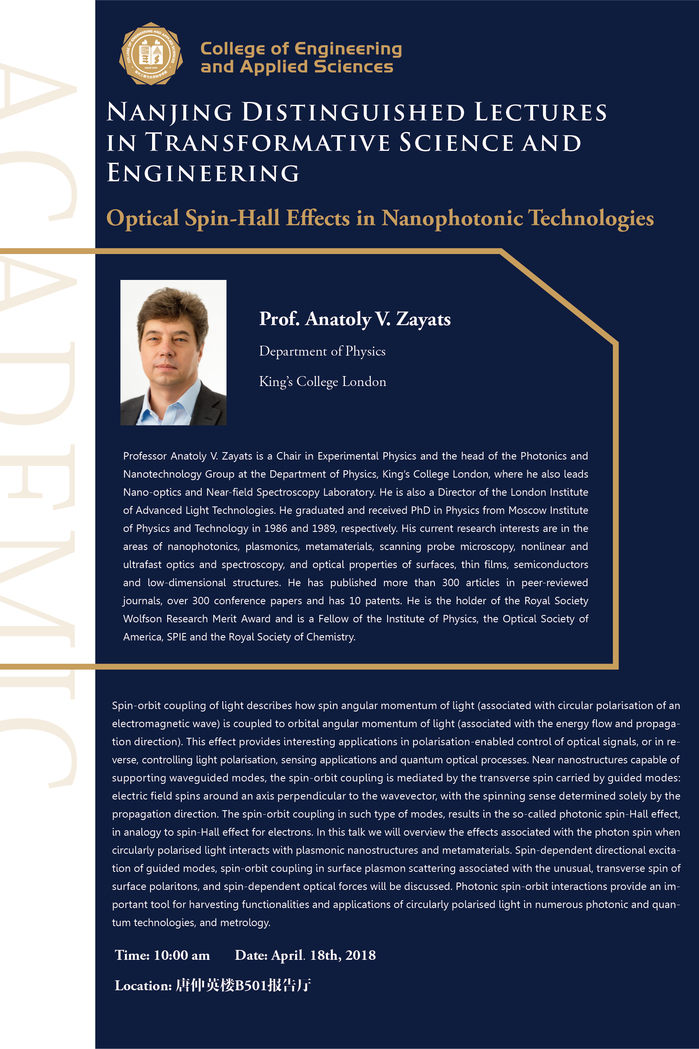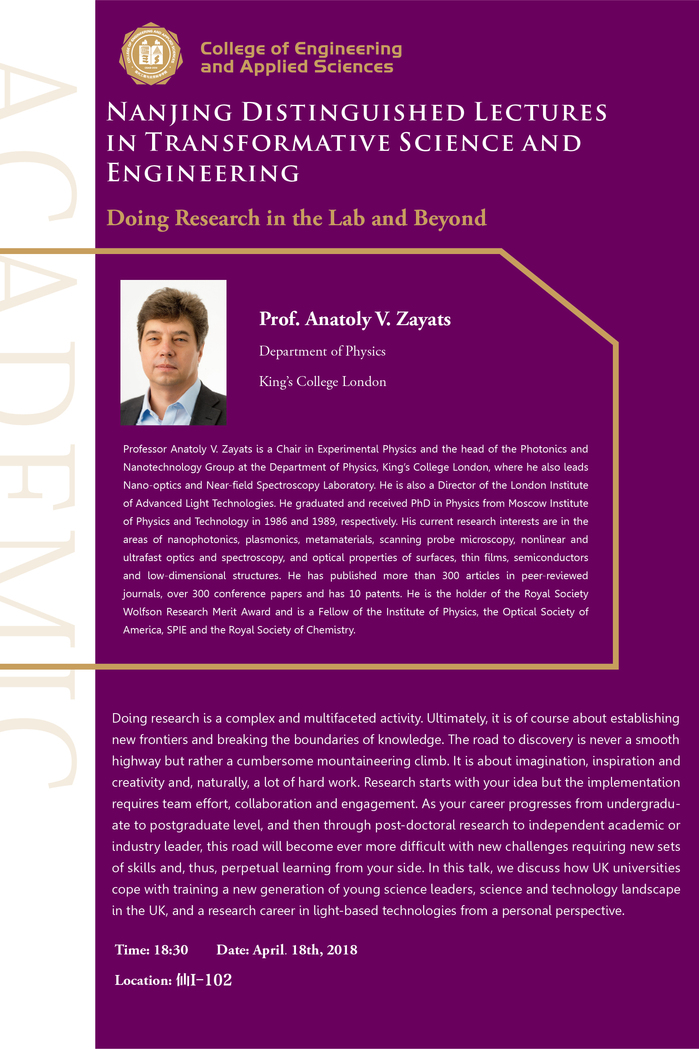Nanjing Distinguished Lecture Series in Transformative Science and Engineering (TSE Lectures) was conceived by a visionary group of faculty and staff at the College of Engineering and Applied Sciences, Nanjing University. The main goal is to invite world-class scholars to visit Nanjing University and to speak on emerging and cross-cutting topics such as new materials, bioengineering, wearable devices, big data, optoelectronics, nanotechnology, and energy.
我们有幸邀请到英国伦敦国王学院Prof. Anatoly V. Zayats,作为TSE Lectures系列讲座的第二讲嘉宾。Prof. Anatoly V. Zayats学术报告信息见下,欢迎各位老师和同学参加!
Prof. Anatoly V. Zayats简介:
Professor Anatoly V. Zayats is a Chair in Experimental Physics and the head of the Photonics and Nanotechnology Group at the Department of Physics, King’s College London, where he also leads Nano-optics and Near-field Spectroscopy Laboratory. He is also a Director of the London Institute of Advanced Light Technologies. He graduated and received PhD in Physics from Moscow Institute of Physics and Technology in 1986 and 1989, respectively. His current research interests are in the areas of nanophotonics, plasmonics, metamaterials, scanning probe microscopy, nonlinear and ultrafast optics and spectroscopy, and optical properties of surfaces, thin films, semiconductors and low-dimensional structures. He has published more than 300 articles in peer-reviewed journals, over 300 conference papers and has 10 patents. He is the holder of the Royal Society Wolfson Research Merit Award and is a Fellow of the Institute of Physics, the Optical Society of America, SPIE and the Royal Society of Chemistry.
时间:2018年4月18日 10:00
地点:唐仲英楼B501报告厅
题目:Optical Spin-Hall Effects in Nanophotonic Technologies
摘要:
Spin-orbit coupling of light describes how spin angular momentum of light (associated with circular polarisation of an electromagnetic wave) is coupled to orbital angular momentum of light (associated with the energy flow and propagation direction). This effect provides interesting applications in polarisation-enabled control of optical signals, or in reverse, controlling light polarisation, sensing applications and quantum optical processes. Near nanostructures capable of supporting waveguided modes, the spin-orbit coupling is mediated by the transverse spin carried by guided modes: electric field spins around an axis perpendicular to the wavevector, with the spinning sense determined solely by the propagation direction. The spin-orbit coupling in such type of modes, results in the so-called photonic spin-Hall effect, in analogy to spin-Hall effect for electrons. In this talk we will overview the effects associated with the photon spin when circularly polarised light interacts with plasmonic nanostructures and metamaterials. Spin-dependent directional excitation of guided modes, spin-orbit coupling in surface plasmon scattering associated with the unusual, transverse spin of surface polaritons, and spin-dependent optical forces will be discussed. Photonic spin-orbit interactions provide an important tool for harvesting functionalities and applications of circularly polarised light in numerous photonic and quantum technologies, and metrology.

时间:2018年4月18日 18:30
地点:仙I-102
题目:Doing Research in the Lab and Beyond
摘要: Doing research is a complex and multifaceted activity. Ultimately, it is of course about establishing new frontiers and breaking the boundaries of knowledge. The road to discovery is never a smooth highway but rather a cumbersome mountaineering climb. It is about imagination, inspiration and creativity and, naturally, a lot of hard work. Research starts with your idea but the implementation requires team effort, collaboration and engagement. As your career progresses from undergraduate to postgraduate level, and then through post-doctoral research to independent academic or industry leader, this road will become ever more difficult with new challenges requiring new sets of skills and, thus, perpetual learning from your side. In this talk, we discuss how UK universities cope with training a new generation of young science leaders, science and technology landscape in the UK, and a research career in light-based technologies from a personal perspective.



